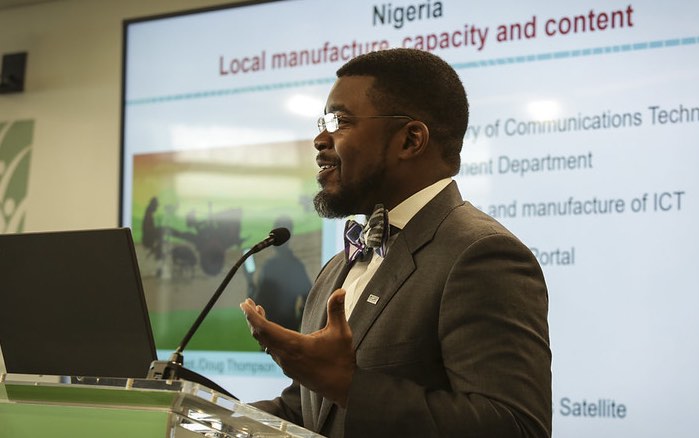Digital technologies are key to transforming food systems and agriculture across Africa. A Nov. 26 policy seminar explored how African countries can develop a “digitalization ecosystem” to help foster growth and competitiveness in the continent’s value chains.
Organized with the Malabo Montpellier Panel (MaMo panel) and moderated by IFPRI Senior Research Fellow David Spielman, the seminar brought together four speakers who addressed how new digital technologies and services are already making an impact on how food is produced, processed, marketed, traded, and consumed across the continent. It also explored how African countries can position themselves to harness and deploy digital technologies to make agriculture competitive and contribute to the development of African economies.
A recent MaMo panel report, Byte by Byte, outlines the promise of digitalization for Africa. The panel, IFPRI Africa Director Ousmane Badiane explained, facilitates understanding positive change on the ground, finding out where progress is taking place, what works, and why and how it does, and applying it. The work is key to addressing malnutrition. “The level of undernourishment is still unacceptably high in Africa,” he said. “If you could mine the information around the progress over the last 20 years and figure out exactly what worked where, then we should be able to facilitate innovation at scale, which is only possible at the highest level.” These efforts allow governments to act in areas including institutional innovation, policy changes, and program interventions.
“Some of the key constraints that slow agricultural growth and transformation in Africa are infrastructural, technological, and institutional, and through digitalization, these barriers can be overcome at scale and shorter time and also at lower costs,” said IFPRI Research Fellow and MaMo Panel Program Leader Katrin Glatzel. If done right, she explained, digitalization can help many farmers overcome economic, social, and geographic isolation.
Digitalization tools such as mobile phones, drones, and startups like Hello Tractor, an ag-tech social enterprise that provides mechanization to farmers by pairing them with tractors near them to properly cultivate their land, are helping smallholders increase production sustainably, reduce post-harvest losses, and improve dietary and nutrition outcomes, Glatzel said.
One potential problem: The abundant data farmers generate via digitalization efforts creates privacy risks. Glatzel suggested that regulation will be needed to prevent potential privacy problems like those now common in Europe and the United States.
“It’s my firm opinion that the future of Africa as far as the agriculture sector is concerned is in agribusiness,” said Debisi Araba, Regional Director for Africa at the International Center for Tropical Agriculture (CIAT). Food systems and agriculture account for 10% of global gross domestic product, he noted. Côte d’Ivoire and Ghana’s CocoaLink is one promising enterprise: Starting as a peer-to-peer learning mechanism for farmers to access extension services and information on markets and weather, it has evolved into a mobile app. Such agribusiness information and communications technology (ICT) innovations, alongside the Ivorian government providing VAT exemptions for ICT, Debisi said, have led to increased broad adoption of these technologies. Another positive example: The Moroccan government’s significant investments in infrastructure and ICT and a virtual network for advisory services for smallholder farmers, part of a digital strategy to help the country achieve emerging economy status by 2020.
World Bank Program Manager Farbod Youssefi outlined the project he co-leads, Enabling the Business of Agriculture (EBA), which focuses on measuring and assessing legal and regulatory impacts that affect agriculture and agribusinesses, and where government and policy makers can directly address the issues raised by the results. ICT, he said, is relevant to farmers across the entire value chain. A 2017 EBA report said mobile services are critical to development in rural areas, yet face regulatory obstacles in many countries. Some countries, like Kenya, are moving forward on building mobile networks, while Ethiopia and others are lagging. Thus, he said, there are many opportunities for intra-regional learning.
“We need smart regulatory environments that promote the development and confident use of digital technologies and services and limit the risks, strengthening local skills development and digital literacy training for populations to ensure that … we create a healthy, not just a healthy startup community, but a healthy use case for these technologies,” said Araba. The work of the MaMo panel, composed of 17 prominent scientists primarily from Africa, as well as from Europe and Asia, continues to promote ways to achieve progress on agricultural development through reports, forums, and webinars that focus on how to do things on the ground.
Katarlah Taylor is an IFPRI Senior Events Specialist.







